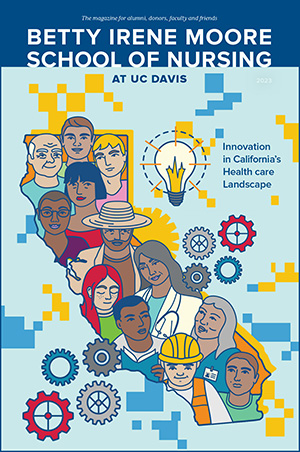Personal Health Network
Research distinction:
School of Nursing eyes improving care and decreasing costs through care coordination
Press Release:
UC Davis nursing school hopes to improve care for cancer patients with social network
People with cancer face a complex care system. Complicated treatment regimens, multiple specialists with individualized therapies and a web of health care bureaucracy drive up cost and decrease quality of care. An interprofessional team of researchers from the Betty Irene Moore School of Nursing at UC Davis and UC Davis Health investigates how to optimize the care received by people undergoing chemotherapy by using technology. The Personal Health Network is a web-enabled application that is accessible by tablet or computer, containing a person’s plan of care, provider correspondence, symptom management and necessary paperwork.
School of Nursing researchers conduct a number of studies looking at health outcomes, care delivery and health care utilization. Current studies include:
Novel Personal Health Network Technology to Enhance Nurse-directed Early Palliative Care for Cancer Patients: A Pilot Study to Establish a Randomized Clinical Trial
Principal Investigator: Janice Bell
Co-Principal Investigator: Katherine Kim
School of Nursing Co-Investigators: Jill Joseph, Ester Carolina Apesoa-Varano, Sheryl Catz
Other UC Davis collaborators: David Copenhaver, Richard Bold
Funder: UC Davis Center for Healthcare Policy and Research, UC Davis Clinical and Translational Science Center, UC Davis School of Medicine, UC Davis School of Nursing
Award: $50,000
Period: June 1, 2014, to Dec. 31, 2015
Palliative care — defined as patient- and family-centered care that optimizes quality of life by anticipating, preventing and treating suffering — encompasses both care coordination and symptom management, assisting and supporting patients throughout the continuum of illness. This project leverages ongoing work to collect preliminary data to support future grant application to the Patient-Centered Outcomes Research Institute (PCORI) to determine if the provision of nurse-directed, technology-enabled palliative care can improve outcomes relevant to cancer patients, their family members and caregivers, and their providers when compared to usual care. The study includes surveys to describe the experiences of cancer patients receiving usual care services in UC Davis Comprehensive Cancer Care Center and qualitative interviews to identify patient-centered features and functions of a novel personal health network software designed for palliative care.
Engaging Patients with Personal Health Network Technology for Chemotherapy Care Coordination
Principal Investigator: Jill Joseph
School of Nursing Co- Investigators: Katherine Kim, Ester Carolina Apesoa-Varano, Janice Bell
Other UC Davis collaborators: Nick Anderson
Funder: Center for Future Technologies in Cancer Care / Boston University
Award: $77,465
Period: July 1, 2014, to June 30, 2015
Nurse care coordination is an approach used to assist patients navigating complex care and treatment and has been demonstrated to improve both the patient experience and health care utilization. The School of Nursing is funded by the McKesson Foundation to conduct a preliminary trial. This research explores whether an innovative personal health network technology can improve outcomes for cancer chemotherapy patients receiving nursing care coordination. Researchers hope to identify patient perceptions of facilitators and barriers of personal health network technology use, and evaluate Its features and functions and o identify and analyze patient questions and support needs during use of the technology. This funding supplements technology development and nursing care coordination capacity being implemented and evaluated with a McKesson Foundation grant.
Boston University Continuation of Collaborative Care Coordination
Principal Investigator: Katherine Kim
Funder: Boston University
Award: $75,136
School of Nursing researchers conduct a randomized intervention pilot for people with cancer to compare nurse-led care coordination incorporating mobile health to nurse-led care coordination without any mobile health enhancements. All participating cancer patients will receive evidence-based care coordination. Working with a private partner, Tiatros, the team will adapt and implement their mHealth platform incorporating HIPAA-compliant and cloud-based secure health-relevant social networking, as well as supporting real-time and ongoing patient symptom reporting.
Improving the Usability, Usefulness and Acceptance of Personal Health Network (PHN) Technology for Chemotherapy Care Coordination among Registered Nurses
Principal Investigator: Janice Bell
School of Nursing Co-Principal Investigators: Ester Carolina Apesoa-Varano, Jill Joseph, Katherine Kim
Other UC Davis collaborators: Richard Bold
Funder: Academic Senate Committee on Research, University of California, Davis
Award: $25,000
Period: July 1, 2014, to Sep. 30, 2015
Emerging evidence suggests that mobile technologies can support care coordination by promoting patient engagement, facilitating team communication and providing a tool for patient-driven social networking; however, little research and development to date has been conducted in this area. In this study, researchers test user experiences of a novel personal health network technology using simulated patient scenarios, “think aloud” methods, key informant interviews and validated survey instruments in a purposive sample of 40 registered nurses.
Use of mHealth to Support Nurse-directed Care Coordination for Chemotherapy Patients: Improving Health, Health Care Delivery and Health Care Utilization
Principal Investigator: Jill Joseph
School of Nursing Co-Investigators: Janice Bell, Katherine Kim
Funder: McKesson Foundation Mobilizing for Health
Award: $199,854
Period: Feb. 26, 2014, to Sep. 30, 2015
School of Nursing researchers, in partnership with the UC Davis Comprehensive Cancer Center, launched a pilot project in which nurses utilize health information technology and mobile phone technology to coordinate and improve selected aspects of cancer care among patients with recurrent cancer in California’s rural Central Valley. The overall goal of this pilot project is to obtain critically important preliminary information regarding the feasibility, acceptability, and potential health and economic benefits of a technology-supported care coordination project in a highly disadvantaged group of patients with recurrent cancer.
Usability and Acceptance of Personal Health Network Technology for R.N.-led Cancer Care Coordination
Principal Investigator: Janice Bell
Funder: Oncology Nursing Society
Award: $25,000
Period: Jan. 1, 2015, to Dec. 31, 2016
This is a pilot study to assess and refine a novel personal health network technology for cancer-care coordination in preparation for a large-scale randomized controlled trial. Researchers describe and identify socio-demographic and job-related predictors of technology acceptance and use among oncology nurses, evaluate implementation of evidence-based chemotherapy symptom management algorithms configured in the network and evaluate the ease-of-use and acceptance of the personal health network for chemotherapy care coordination.





